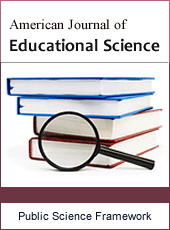American Journal of Educational Science
Articles Information
American Journal of Educational Science, Vol.4, No.4, Dec. 2018, Pub. Date: Oct. 9, 2018
Discussion on the Student-Centered Teaching of College Mathematics
Pages: 144-148 Views: 2195 Downloads: 851
[01]
Kunping Zhu, Department of Mathematics, East China University of Science and Technology, Shanghai, China.
College mathematics is the core course of science and engineering. The importance of the course lies in its wide application, whereas many students are frustrated by learning the course. Commonly, each subject of college mathematics such as advanced mathematics, linear algebra, probability and statistics, has a high rate of failure. As a result, college mathematics is known as very difficult to learn. There are three factors involved: the characteristics of college mathematics, the learning habits of students, and the teaching of college mathematics. In practice, the student’s learning effects may be not directly concerned with the teacher’s classroom teaching, and the omissions in each teaching aspect will affect the student’s learning. In this paper, some problems in current teaching of college mathematics are enumerated. Based on the student-centered idea, several specific measures are proposed for the improvement of teaching. The SPOC mode of blended learning is recommended for the teaching of college mathematics, for it is quite flexible to combine the advantages of traditional teaching and online teaching in practice. The construction of a good learning environment for the students is emphasized. Namely, the key is that the teaching of college mathematics should meet the student’s current level, and be focused their learning needs whether the teaching is online or in the classroom.
Student-Centered, Blended-Learning, Mathematics, SPOC, MOOCs
[01]
Johnson, L., Adams Becker, S., Estrada, V., and Freeman, A., NMC Horizon Report: 2015 Higher Education Edition, The New Media Consortium, Austin, 2015.
[02]
Information on: http://www.moe.gov.cn/srcsite/A08/s5664/moe_1623/s3843/201707/t20170728_310304
[03]
Sharon O'Malley, Effective Teaching Online: https://www.insidehighered.com/digital-learning/article/2017/07/12/7-guidelines-effective-teaching-online
[04]
Scott Jaschik, Adaptive Learning for Advanced Math: https://www.insidehighered.com/digital-learning/article/2017/01/23/uc-santa-cruz-uses-adaptive-learning-encourage-students-take
[05]
Kang Yeqin, An Analysis of SPOC: Post-MOOC Era of Online Education, Tsinghua Journal of Education 35 (2014) 85-93.
[06]
Maryellen Weimer, Five Characteristics of Learner-Centered Teaching: https://www.facultyfocus.com/articles/effective-teaching-strategies/five-characteristics-of-learner-centered-teaching/
[07]
Gloria Brown Wright, Student-centered Learning in Higher Education, International Journal of Teaching and Learning in Higher Education 23 (2011) 92-97.
[08]
Liu Xianjun, On the Student-centered Idea, Journal of Higher Education, 33 (2012) 1-6.
[09]
Qi Chunxia, Discussion on communication in Mathematics, Shuxue Tongxun, 21 (2001) 1-4.
[10]
Kunping Zhu, Jianping Liu, Statistical analysis for the evaluation of online courses, Education Theories and Teaching Research, 11 (2013) 1-3.

ISSN Print: 2381-7127
ISSN Online: 2381-7135
Current Issue:
Vol. 6, Issue 2, June Submit a Manuscript Join Editorial Board Join Reviewer Team
ISSN Online: 2381-7135
Current Issue:
Vol. 6, Issue 2, June Submit a Manuscript Join Editorial Board Join Reviewer Team
| About This Journal |
| All Issues |
| Open Access |
| Indexing |
| Payment Information |
| Author Guidelines |
| Review Process |
| Publication Ethics |
| Editorial Board |
| Peer Reviewers |


